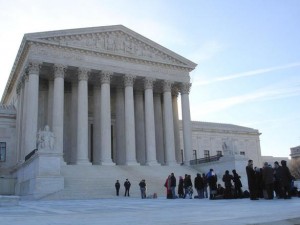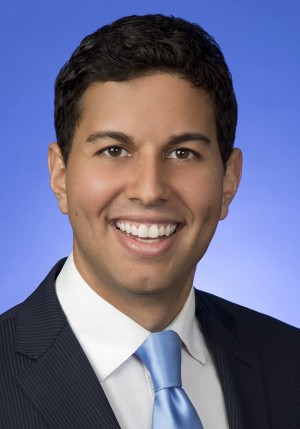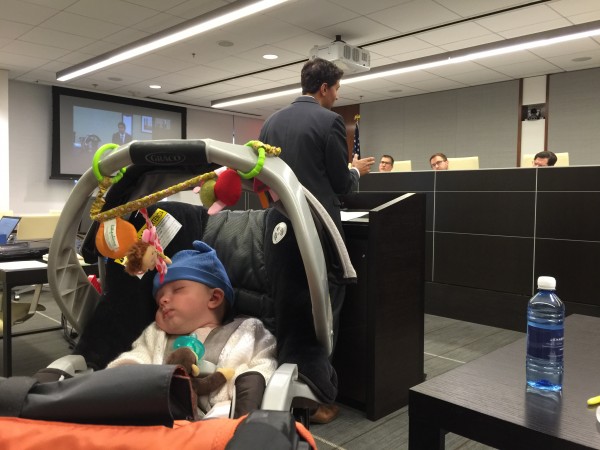
Waiting for their date with SCOTUS.
Law firms take different approaches to their associates’ professional development. Some firms let associates argue merits cases before the Supreme Court of the United States, while other firms won’t let their associates argue motions before a magistrate judge.[1]
Back in 2009, I wrote about Lindsay C. Harrison, at the time a fifth-year associate at Jenner & Block, who got to argue a merits case before SCOTUS. It was actually Harrison’s first oral argument in any court — and she won a resounding victory in the case, Nken v. Holder.

The Law Firm’s Guide To Trust Accounting And Three-Way Reconciliation
Proper trust accounting and three-way reconciliation are essential for protecting client funds and avoiding serious compliance risks. In this guide, we break down these critical processes and show how legal-specific software can help your firm stay accurate, efficient, and audit-ready.
Some seven years later, Harrison is now a partner at Jenner, where she’s “paying it forward.” She’s helping a fellow Harvard Law School grad, fifth-year associate Amir H. Ali, prepare for his debut before the high court on Wednesday morning. Ali will be arguing in Welch v. United States, a criminal case that, per SCOTUSblog, raises “whether Johnson v. United States announced a new substantive rule of constitutional law that applies retroactively to cases that are on collateral review.” (If that sounds confusing, simply read Professor Rory Little’s excellent argument preview.)
In some ways, Lindsay Harrison and Amir Ali — graduates of a top law school, lawyers at a top law firm, and former federal law clerks — are typical Supreme Court advocates. But in other ways, such as their diversity and their youth, they are not. As Joan Biskupic and her Reuters colleagues documented last year in their superb special report on the SCOTUS bar, most Supreme Court arguments go to a small group of elite lawyers, who tend to be white, male, and old (which is why experience in the U.S. Solicitor General’s Office is so coveted; if you want to argue in front of the Supreme Court before you turn 40, hie thee to the S.G.’s office).
As Zoe Tillman wrote last fall in the National Law Journal, “associates are far less likely to argue cases in the Supreme Court than partners.” So it was both newsworthy and impressive when three Biglaw associates — Ethan Davis of King & Spalding, Michael Kimberly of Mayer Brown, and Fred Liu of Hogan Lovells — argued before SCOTUS within a few weeks of each other. Davis, Kimberly, and Liu all graduated from Yale Law School in 2008, so they argued before the Court as seventh-year associates (Kimberly’s now a partner); Amir Ali, a 2011 grad who became a fifth-year associate just a few months ago, is even more junior.
I spoke with Harrison and Ali by phone earlier today about their upcoming argument in Welch v. United States. Here’s a (lightly edited and condensed) write-up of our conversation.

[E-BOOK] 5 AI Productivity Hacks To Save Time And Streamline Your Law Firm
Discover five practical ways to harness AI and eliminate busywork—so you can focus more on your clients and less on repetitive tasks.

Amir H. Ali of Jenner & Block
DL: Congratulations on the upcoming argument, and good luck! So tell us, in a nutshell, how you came to have this case and this argument before the Supreme Court.
AHA: Since the Court’s decision in Johnson v. United States last Term, a few of us here at Jenner had been tracking the issue of Johnson‘s retroactivity, and whether people sentenced under the “residual clause” struck down in Johnson would get relief even if their convictions were final before Johnson was decided. We had enjoyed some success in a number of individual pro bono cases but did not have a case to bring before the Court.
LCH: It was a tricky situation. The way to get this issue to the Court wasn’t clear. The real circuit split on this question involves “second or successive” federal habeas petitions, but you’re prohibited by statute from seeking certiorari in such cases. How can you get the Court to hear a case where cert can’t be granted? You can try to to present the issue through the Court’s original habeas jurisdiction or mandamus proceedings, but that’s tough.
And then we came across Gregory Welch’s petition for cert — a pro se petition he filed with the Supreme Court, which by coincidence of timing was an initial rather than second or successive petition. He filed for habeas relief, his habeas petition got denied, but then he sought reconsideration based on Johnson. So his case raises the retroactivity question squarely, but it’s still technically his first habeas petition.
AHA: My colleague Trent McCotter noticed Welch’s petition on the Court’s docket and sent it to me because we had been working on this issue. The government had waived its right to respond, but the Court requested a response.
DL: So the Supreme Court was ordering the Solicitor General’s office to file a response to a pro se prisoner’s petition for cert. Did that jump out at you as significant?
LCH: Well, it does happen from time to time — it’s noteworthy, to be sure, but not so unusual that it cries out for action.
AHA: It’s generally hard to read too much into the Court’s ordering a response, but in this case it jumped out at us because we had been tracking the Johnson retroactivity issue. After we saw the order for a government response, we looked at the petition and realized it was our issue.
DL: So how did you contact Mr. Welch to offer to represent him? Is he currently incarcerated?
AHA: We reached out to him in prison. We sent him a letter, followed up by phone and, after he asked us to represent him, I ultimately visited him in prison. We filed a reply to the government’s response to Mr. Welch’s cert petition in December.
DL: And then when did the Court grant cert?
LCH: January 8 — easy for me to remember, the day after my daughter was born.
DL: How did you feel when you heard that cert had been grated in your client’s case?
AHA: Ecstatic. But I was in a meeting with another client at the time when orders came down. I checked my phone and saw I had all these emails from partners, including Lindsay, telling me the case had been granted. I also had emails from members of the media asking for the briefs. But I put my phone down and finished up my meeting first.
LCH: Amir was in a meeting when he heard the news. I was still in the hospital, having given birth the day before. I was hooked up to an I.V., checking the Order List on my phone. It’s a bit of a cliché, Biglaw partner working from her hospital bed, but it was true in my case. I didn’t mind; I had nowhere else to go. We had a conference call later that day, which I also joined from my hospital bed.
DL: The petition was granted on January 8 and the case is being argued this Wednesday, March 30. Isn’t that a bit fast?
AHA: The case is on an extremely expedited briefing schedule, with around 30 days being cut off from the standard schedule. For prisoners who want to file a second or successive habeas petition based on Johnson, the one-year statute of limitations started running from the day Johnson was decided last year, so there’s some urgency. [Ed. note: Johnson was decided on June 26, 2015, so it didn’t get quite as much attention as the other case handed down that day: Obergefell v. Hodges, which made marriage equality a reality nationwide.]
DL: You graduated from Harvard Law in 2011, so you’re a fifth-year associate. I’m guessing this is your first oral argument before the Supreme Court?
AHA: It’s my first argument before the Court, although my second time at counsel table. Last Term — exactly one year ago from my argument this Wednesday, actually — I was at counsel table when [Jenner partner] Michael DeSanctis argued in Brumfield v. Cain, a death penalty case I worked with him on.
DL: And how many other appellate arguments have you had?
AHA: This will be my second. I argued before the Fifth Circuit on remand in Brumfield.
DL: Your second appellate argument, and it’s before the United States Supreme Court. Have the past few weeks been hectic?
AHA: Extremely busy. Because of the expedited briefing schedule, we had to prepare our reply brief while also getting ready for argument. We filed our reply brief just last Wednesday.
LCH: We had our first moot before the reply was filed, in fact. The expedited nature of the case has been a fun, engaging aspect of it.

One of Amir Ali’s moot courts (with Lindsay Harrison’s newborn baby, sleeping… like a baby).
DL: How many moots have you had?
AHA: Four moots — three moots internally, with partners and associates here at Jenner, and one moot over at Georgetown Law’s Supreme Court Institute.
LCH: Another unusual aspect of this case is that the government is siding with us on the issue of Johnson‘s retroactivity. The Court appointed counsel to argue the other side — Helgi Walker of Gibson Dunn.
DL: I’ve noticed such appointments in a few cases over the years. Who decides on those appointments?
LCH: By tradition or practice, it seems that the circuit justice for the circuit where the case came from makes the appointment. Justice Thomas is the circuit justice for the Eleventh Circuit, where this case originated, and Helgi Walker is an outstanding appellate attorney in D.C. who is a former clerk of his.
DL: So how will argument time be allotted?
AHA: One hour of argument — 15 minutes for us, 15 minutes for the government, and 30 minutes for the Court-appointed amicus.
DL: With your argument less than two days away, how are you feeling?
AHA: I’m feeling very prepared. Anyone arguing before the Supreme Court would be lying if they said they weren’t nervous, but that’s what keeps me going.
DL: And how do you expect the argument to go? Retroactivity is notoriously tricky.
AHA: I think it’s anybody’s guess what in particular the Justices will be interested in. As you note, retroactivity is a complicated area of law, a topic that law students are afraid to see on their Fed Courts exams. I’m expecting a lot of interesting hypotheticals and no shortage of complexity. The issue itself might be of more interest to lawyers than to the public, but how the Court rules has the potential to affect a lot of people’s lives. A number of people are waiting for this case to be decided, and a number of cases have been held in abeyance for it.
DL: Speaking of affecting people’s lives, Lindsay, what’s the latest with your client from the Nken immigration case that you argued before the Court back in 2009?
LCH: Awesome news! I got a text from him last week. He just got sworn in as a U.S. citizen earlier this month. There was a lot of activity in the case on remand, including proceedings before the immigration judge and the Board of Immigration Appeals, so it’s nice to see him finally become a citizen.
DL: Now the Supreme Court has changed a bit in composition since Lindsay’s argument, most recently as a result of Justice Scalia’s passing. How do you expect the loss of Justice Scalia to affect the outcome of your case?
AHA: That’s anyone’s guess. We’ve heard arguments on both sides.
LCH: On the one hand, Justice Scalia wrote Johnson, but on the other hand, he was not overwhelmingly in favor of giving retroactive relief. It would have been interesting to see how he felt about applying his own decision retroactively.
DL: So what do you guys have planned between now and Wednesday morning? Any more moots scheduled?
AHA: We’re all done with moots, just some final prep and polishing from now on. I’m going to try and relax until I get called up to speak.
LCH: And definitely get some good sleep. And salmon — I’ve been trying to convince Amir to follow in the Jenner tradition of eating a lot of salmon before a Supreme Court argument. It started with [Jenner partner turned Solicitor General] Don Verrilli, who said that salmon is “brain food.”
AHA: I’m eating salmon tonight and tomorrow, so it’s all set up.
DL: I’ll ask you what I asked Lindsay years ago: what are you wearing to Court?
AHA: My usual suit that I’ve had for ages. My mom bought me a necktie that she really wants me to wear, so I expect to do that.
DL: Will she be there in the courtroom? Who else will be joining you?
AHA: Yes, she and my dad and my wife will attend, along with a large Jenner contingent — the incredible team that has been working with me on the case. I have to say that it’s pretty cool to be at a firm that supports its associates in such extraordinary endeavors. Lindsay has been amazing, and so has [appellate practice chair] Paul Smith, who helped out a lot with strategy during the cert stage and participated in moots.
LCH: But he couldn’t come to the moot this morning, since he had his own argument before the Court today.
DL: Wow, so two SCOTUS arguments in one week — a busy Term for Jenner.
LCH: We should end this Term with six arguments and at least seven decisions. My partners Paul Smith and Adam Unikowsky won the lesbian adoption case, V.L. v. E.L., but that was a summary reversal — no oral argument.
AHA: It’s great to have the torch passed. I’m very grateful to Lindsay for all of her help, especially since she’s actually supposed to be out on maternity leave right now.
LCH: I’m happy to work on this while on leave — I love getting to work on cases before the Court, both as an advocate and as a supervisor of associates arguing before the Court.
DL: Congrats to you both on the upcoming argument, and best of luck on Wednesday!
P.S. If you’re interested in the Supreme Court — and if you’ve read this far, presumably you are — you’re cordially invited to this fun event on April 5 in D.C., a “Supreme Court Book Fair” at Georgetown Law’s Supreme Court Institute (where one of Amir Ali’s moots took place). The discussion will feature authors Irin Carmon (Notorious RBG), Anthony Franze (The Advocate’s Daughter), Kermit Roosevelt (Allegiance), Jay Wexler (Tuttle in the Balance), and yours truly (Supreme Ambitions; yes, all links are affiliate links). Fellow SCOTUS author Tony Mauro (Illustrated Great Decisions of the Supreme Court) will moderate. You can learn more and RSVP via SCOTUSblog.
FOOTNOTES
[1] Yes, there’s a difference between pro bono cases and cases for paying clients (although one would hope that pro bono cases get treated just as seriously). DLA Piper didn’t let its associates argue in court in a paid case, while Jenner is letting an associate argue in court in a pro bono case (as it has done in the past).
But DLA Piper can still be criticized, since there was really very little risk to letting associates argue before Magistrate Judge Paul Grewal in light of the fact that he explicitly invited it (and, as my colleague Joe Patrice noted, telegraphed that he’d grade on a curve). And Jenner can still be praised for letting its associates argue before the Supreme Court, even in “mere” pro bono cases, because (1) the firm puts its reputation on the line every time one of its lawyers appears before the high court, regardless of the type of case, and (2) at many other firms, partners with no or few SCOTUS arguments under their belts would’ve grabbed these arguments for themselves, pro bono or not.
[2] Yale Law School grads who clerked for the Ninth Circuit? I have an understandable weakness for that background (and Ethan Davis and Fred Liu both clerked for my former boss, Judge Diarmuid F. O’Scannlain). See also Audrey Coyne, the protagonist of my novel set in the Ninth Circuit, Supreme Ambitions.
Argument preview: Complex retroactivity questions arising from Justice Scalia’s void-for-vagueness decision last Term [SCOTUSblog]
Rookies Take Bat Before High Court [National Law Journal]
Earlier: Jenner & Block Associate Argues Her First Case – In The Supreme Court
Proof That Law Firms Don’t Really Care About Associate Development